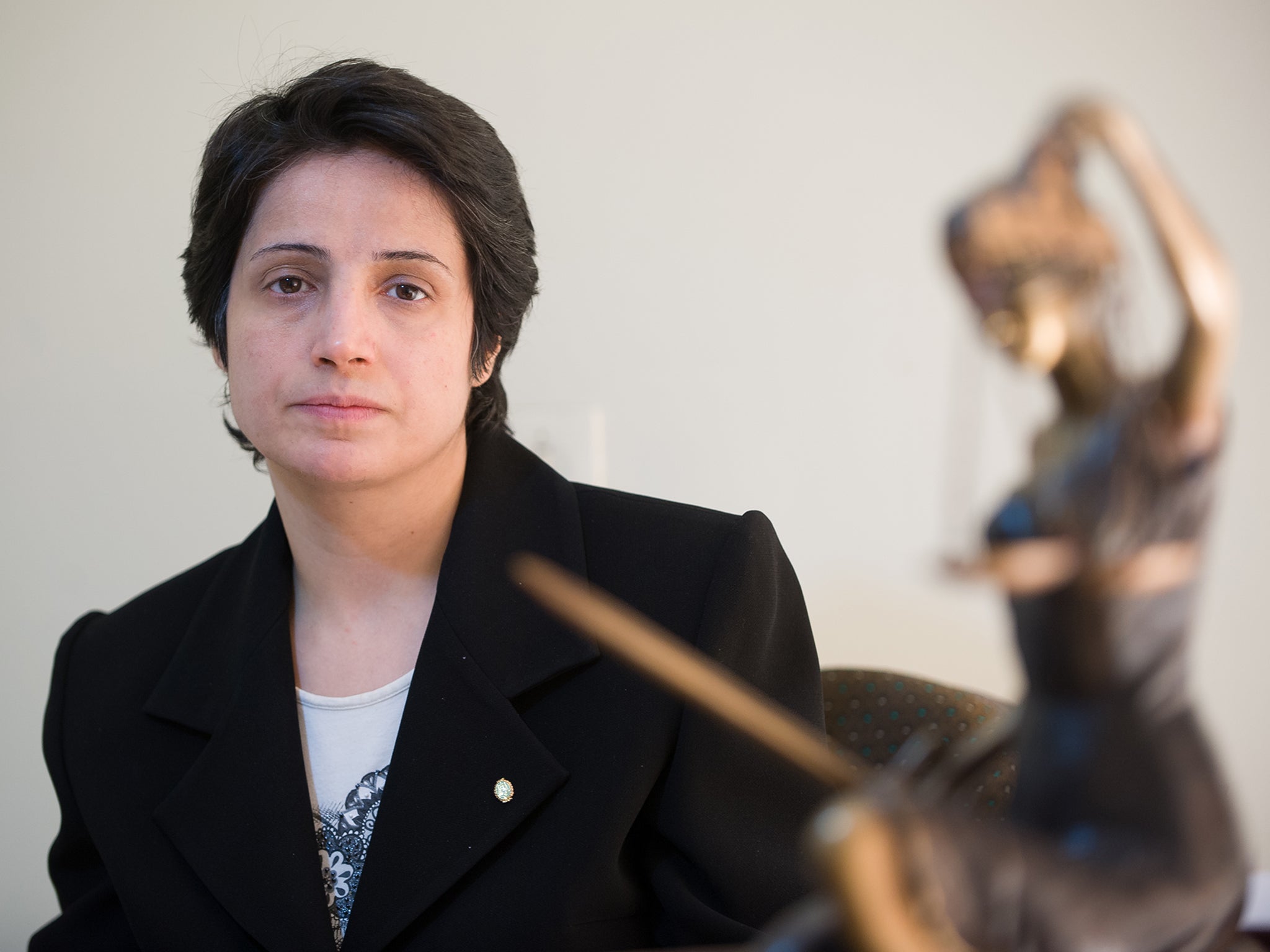Jailed human rights lawyer Nasrin Sotoudeh is Iran’s Nelson Mandela – why aren’t we fighting for her?
No one is more emblematic of the struggle to achieve the freedoms that we still take for granted in the west than Sotoudeh, whose clients include women jailed for taking their hijabs off in street protests last year


Your support helps us to tell the story
From reproductive rights to climate change to Big Tech, The Independent is on the ground when the story is developing. Whether it's investigating the financials of Elon Musk's pro-Trump PAC or producing our latest documentary, 'The A Word', which shines a light on the American women fighting for reproductive rights, we know how important it is to parse out the facts from the messaging.
At such a critical moment in US history, we need reporters on the ground. Your donation allows us to keep sending journalists to speak to both sides of the story.
The Independent is trusted by Americans across the entire political spectrum. And unlike many other quality news outlets, we choose not to lock Americans out of our reporting and analysis with paywalls. We believe quality journalism should be available to everyone, paid for by those who can afford it.
Your support makes all the difference.One thing few know is that Iranians invented Brexit. Well, sort of, for on 28-29 March 1979, 40 years to the day set for Britain’s exit from the EU, they held a referendum.
The choice: Islamic republic, “yes” or “no”. Unlike Brexit, however, no one had thought to suggest an alternative, such as, say, Scandinavian social democracy, or a Corbynista utopia where at the end of each journey on the nationalised railways, passengers salute the driver, the system and the great leader.
So, as it was, 95 per cent of the voter turnout of 70 per cent, voted “yes” to an Islamic Republic.
Decades later, a diaspora whose luminaries include Dara Khosrowshahi, the Travis Bickle-lookalike who is aptly the head of Uber, and whose lesser known hard-workers include dozens of Uber drivers, not a small number of whom are scientists and engineers, is still coming to terms with the consequences of the will of the people realised.
Unlike Brits, Iranians, of course, were not exiting a political and economic bloc. Like 52 per cent of Brits however, arguably if unfairly, they were taking leave of their senses: when you have been waiting for a bus for nine hours in the cold, you are very likely to board the next car, even if its Nigel Farage or Ayatollah Khomeini in the driving seat.
And so, on April Fool’s Day 1979, the Islamic Republic of Iran was declared a fact – one that millions struggle to live with daily with soaring inflation, an ever-tumbling currency, a war on women’s rights, and the threat of incarceration, torture and death for daring to highlight or fight injustice.
No one is more emblematic of the struggle to achieve the freedoms that we still take for granted in the west than the 55-year-old human rights lawyer Nasrin Sotoudeh, whose clients include women jailed for taking their hijabs off in street protests last year. For she herself has been arbitrarily jailed and is in need of a Nasrin Sotoudeh to get her out.
When the Iranian clerics and their hordes of young henchmen came to power in 1979, they derided the dictator monarch, Mohammad Reza Shah Pahlavi (the Shah of Iran) for having filled his jails with political prisoners. In ensuing decades, they have done that man proud by smashing dissent outright and, more cleverly, co-opting swathes of the Iranian upper-middle-class into selling the Islamic Republic to the west as the Punch-and-Judy show of reformers-versus-hardliners.
The Persian penchant for hospitality comes in handy when you are courting favour with journalists, politicians and political advisers, with the notion that the Islamic Republic is indeed some form of democracy.
And so the reformists – be they politicians, business people or artists – have western politicians and journalists believing that Khomeini’s system of rule by Shia-Islamist jurists (velayat-e-faqih) can be reformed into something other than the durable Islamic state whose Intel Core i7 chip is terror.
It’s left to NGOs such as Amnesty International and Human Rights Watch to impress names such as Sotoudeh, Narges Mohammadi and Arash Sadeghi on the consciousness and consciences of the press.
Appearing on Radio 4’s News Quiz last year, the comedian Jeremy Hardy neatly summed up why Brits should care. Britain, he said, “deposed the democratic regime of [progressive-nationalist leader Mohammad] Mossadegh in Iran in the mid-50s ’cos he nationalised the Anglo-Iranian Oil Company, now BP.
“We installed the Shah... that went well. That provoked a revolution which was taken over by Islamists. That meant that the west had to build up Saddam Hussein to counter the threat from Iran. That meant that we then had to have a war with him. That meant that that created a basket case which created Isil, that spilled over into the whole of the Middle East.”
When another Jeremy – Hunt – went to Iran in December, solely with the intention of securing the release of Nazanin Zaghari-Ratcliffe, he was refused permission to visit her but had brought her a present: a copy of Nelson Mandela’s Long Walk to Freedom; hardly a memory-foam pillow for someone who was not even a political activist when she was arbitrarily arrested three years ago. Mandela was in prison 27 years.
This act, though, was a tacit acceptance by the foreign secretary that the political prisoner is nothing short of a Mandela in moral standing.
In September, Sotoudeh was awarded the Ludovic Trarieux international human rights prize which Mandela received when he was in jail in 1985. The accolade, along with her 2012 Sakharov Prize and her recent invitation by Emmanuel Macron to join a G7 gender equality council, testifies to the fact that while not pursuing human rights in Iran with any vigour, Europe is aware of Sotoudeh’s plight – only no one wants to upset the Iranian government.
The sensibilities of foreign offices are mirrored by reporting which is pretty much exclusively informed by the paradigm of reformers (good) versus hardliners (not-so-good).
Human rights, alas, were not a concern of President Obama in negotiating the 2015 Joint Comprehensive Plan of Action, or for that matter, when protesters in Iran were being shot in the street in 2009 – or things might be different.
In 2012, Mitt Romney said: “When millions of Iranians took to the streets in June of 2009, when they demanded freedom from a cruel regime that threatens the world, when they cried out: ‘Are you with us, or are you with them?’ – the American president was silent.”
The extent of violence was such Obama eventually said: “I am deeply troubled by the violence that I’ve been seeing on television. I think that the democratic process – free speech, the ability of people to peacefully dissent – all those are universal values and need to be respected.”
In doing so, he legitimised elections where the candidates are vetted in the absence of a free press as “democratic”.
This hugely influenced how the world should view Iran, marginalising human rights.
The EU foreign minister Federica Mogherini, for example, has clearly struck a singular rapport with Iran’s foreign minister, Javad Zarif, a man who denies there are human rights abuses in Iran.
Sotoudeh, mother of two children, first jailed in 2010, observed no such silence when she was released in 2013. She chose to continue her work in spite of the threats and humiliation she she’s been forced to endure. Sotoudeh herself has said she is currently serving a 12-year maximum sentence for one of seven charges (all of which total 38.5 years), as well as 148 lashes in total, and could have the remaining charges implemented at a later stage. But whether she’ll be behind bars for three decades or a dozen years is moot: either figure is an excruciatingly lengthy sentence.
At this point, it’s clear that in marking 40 years of Islamist rule today, Iran needs nothing more than a people’s vote: dictatorship of the Islamic-jurist, or democracy of the political prisoner.
Join our commenting forum
Join thought-provoking conversations, follow other Independent readers and see their replies
Comments